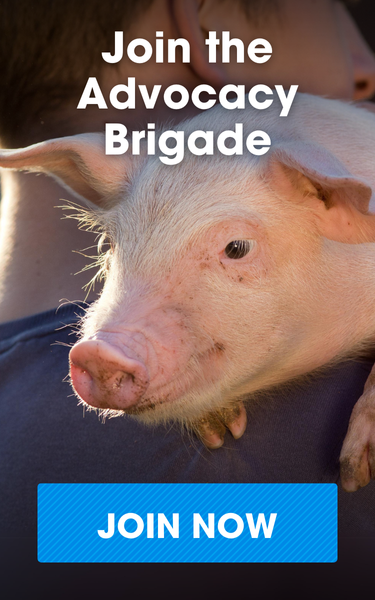
California Ban on a Cruel Practice Set to Take Effect—and the Meat Industry Is Fighting Tooth and Nail to Stop It
By: Paul Willis, Niman Ranch Founding Hog Farmer and Nancy Roulston, Sr. Director of Corporate Policy, ASPCA
It’s time for the pig farming industry to stop fighting the future of agriculture and embrace public demand for higher welfare practices.

The majority of the pig farming industry is still using gestation crates—confining pregnant pigs for nearly the entirety of their 16-week gestation period. The average industry gestation crate is only seven feet by two feet—preventing a mother pig from turning around or moving about freely. Such crates can physically and psychologically harm the animals trapped inside.
The public has no appetite for this kind of cruelty:
- Polling shows 79% of regular pork consumers would be more likely to buy those products from a company committed to ending the cruel confinement of pregnant pigs.
- 71% of consumers would be willing to pay more for a product if the company had committed to eliminating gestation crates.
- 89% of Americans are deeply concerned about how factory farms negatively affect animal welfare, worker safety and public health.
Producers and investors alike should recognize the significant financial and reputational risks of failing to end this widely condemned and outdated practice.
In 2018, Californians voted overwhelmingly to end this practice by passing Proposition 12, a critical farm animal welfare law. To date, 10 states have passed initiatives banning the use of gestation crates.
Proposition 12 goes into effect on January 1, 2022. In addition to banning the sale of pork in California from pigs raised in gestation crates, this measure requires cage-free housing and more space for factory farmed calves, pregnant pigs and egg-laying hens raised on farms in the state.
The industrial meat sector has filed multiple lawsuits in hopes of overturning this legislation, attempting to take their challenges all the way to the U.S. Supreme Court. Fortunately, these legal challenges have proven unsuccessful, paving the way for welfare reforms for farmed animals across the country.
More Good News!
There are alternatives to inhumane factory farming.
Producers at various scales in the U.S. and globally are raising pigs without gestation crates and providing open pen housing with space to move freely as well as enrichments like straw bedding.
Companies like Niman Ranch—with a network of 650 Certified Humane® independent pig farmers—are helping to prove gestation crates are not necessary. Niman Ranch farmers raise pigs on pasture or in barns with plenty of room and deep bedding. While Niman Ranch’s standards far exceed California’s new baseline, this law is still an important first step for reforming the factory farming industry.

Industry Change Won’t Be Easy—But It Can Be Done
As simple as eliminating crates may seem, transitioning an entire industry takes time. The industrial meat sector has been resisting this transition for years. Rather than providing resources to help farmers comply with California’s new law, it instead files lawsuit after lawsuit—attempting to prolong the confinement of millions of animals and setting producers up to fail.
While meat trade groups have tried to position themselves as the voice of all farmers, certain companies have disrupted this industry narrative. Last month, Niman Ranch stepped out as the first meat brand to support Proposition 12 in the courts by filing an amicus brief to counter an industry lawsuit.
We urge the broader meat industry to embrace consumer demand for higher welfare standards by investing in farmers as they transition to more humane practices.

How You Can Help Farm Animals
You can advocate for farm animals today by buying more humane products and supporting commonsense policies that transition the food industry away from factory farming.
The ASPCA makes it easy to find the brands that prioritize animal welfare. We offer a list of welfare-certified products and plant-based alternatives as part of our Shop With Your Heart program.
Together, we can build a more humane, sustainable and healthy food system.

